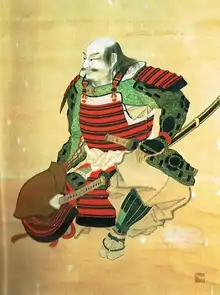Naitō Masatoyo | |
|---|---|
 Painting of Japanese samurai, Naitō Masatoyo, possibly painted in the 1560’s | |
| Native name | 内藤 昌豊 |
| Birth name | Kudō Sukenaga |
| Nickname(s) | Naitō Masahide |
| Born | 1522 |
| Died | June 29, 1575 |
| Allegiance | |
| Battles/wars | Battle of Mikatagahara (1573) Battle of Nagashino (1575) |
| Spouse(s) | Ōi no Kata |
| Children | Takeda Shingen |
Naitō Masatoyo (内藤 昌豊) also known as Naitō Masahide (内藤 政秀) (1522 – June 29, 1575) was a Japanese samurai of the Sengoku period. He was known as one of the "Twenty-Four Generals of Takeda Shingen".[1] Masatoyo was the second son of Takeda Nobutora's senior retainer, Kudō Toratoyo. He was first called Kudō Sukenaga. The family's fortunes fell when Toratoyo lost favor with Nobutora and was killed by him.
Military life
At Mikatagahara (1573) he led a charge into the Tokugawa ranks[2] and was at the forefront of the fighting at Nagashino (1575).[3][4] He had opposed the attack at Nagashino and, in the course of the battle, was shot many times by arrows before being beheaded by Asahina Yasukatsu. He had been noted for his warm disposition and his equally impressive talents in warfare and administration. He had even been a mentor to the young Katsuyori, Takeda Shingen's fourth son.
Personal life
Sukenaga and his brother escaped the Takeda clan and, according to the predominant theory, they wandered around the Kantō region. After Nobutora was exiled by his son Takeda Shingen, Shingen recalled the Kudō brothers, reinstating their lands and permitting the family's restoration. Shingen also formally excused Toratoyo of any wrongdoing and sent a letter of apology and money to the family. Furthermore, the Kudō were given command of 50 cavalry and granted the rank of samurai-taishō (侍大将).
In 1566 he was given Minowa Castle in Kōzuke Province after it fell to the Takeda.[5]
Death
At Nagashino, after disagreeing with Katsuyori, he rushed into battle, dying an honorable death.
References
- ↑ Internet Movie Database (IMDb), "Shingen Takeda (Character) from Kagemusha (1980); retrieved 2013-5-17.
- ↑ Turnbull, Stephen (2000). The Samurai Sourcebook. London: Cassell & C0. p. 222-223. ISBN 1854095234.
- ↑ Turnbull, Stephen (1977). The Samurai. New York: Macmillan Publishing Co., Inc. pp. 156–160. ISBN 9780026205405.
- ↑ Turnbull, Stephen (1987). Battles of the Samurai. London: Arms and Armour Press. pp. 79–94. ISBN 9780853688266.
- ↑ "日本の城がわかる事典「箕輪城」の解説". kotobank. Retrieved 23 October 2021.